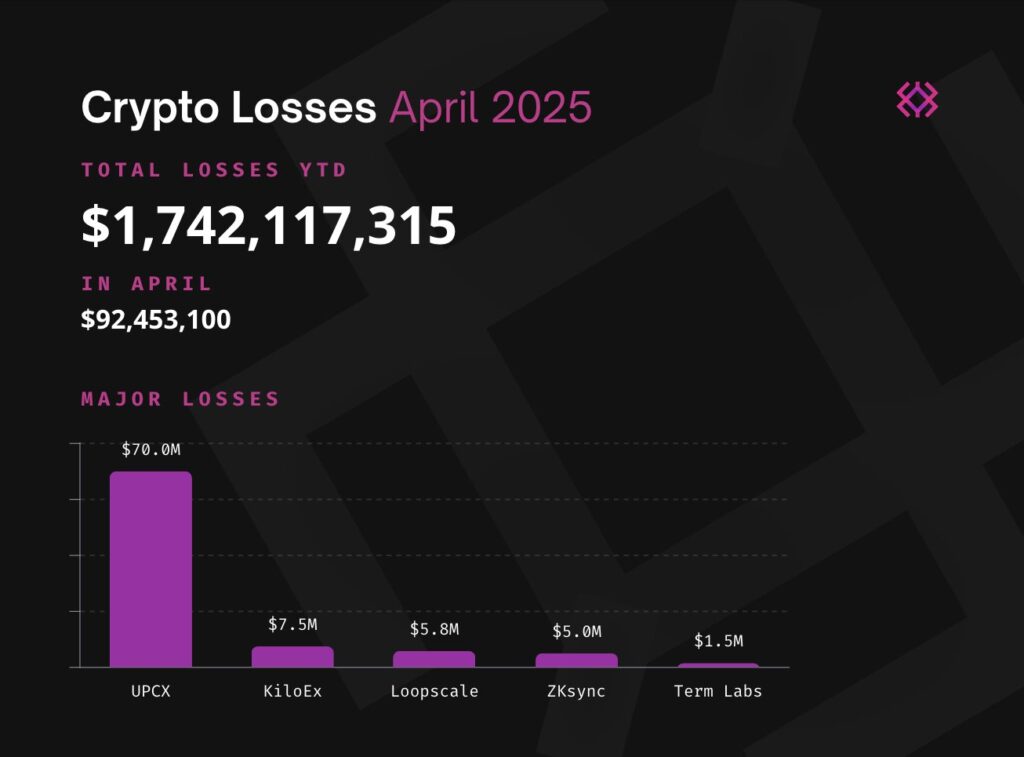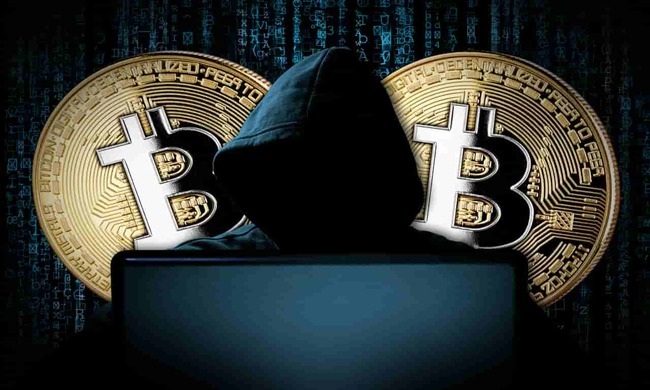Highlights:
- Crypto hacks in April 2025 reached $92 million, marking a 124% increase from March.
- Most of these losses occurred in DeFi hacks, like the $70 million that was lost by UPCX.
- State-backed threat actors are emerging as a significant concern for the industry.
Hacks in the crypto sector increased this April, with the overall loss estimated at $92 million, primarily affecting the DeFi platforms. As per the report from Immunefi, these losses have risen by a staggering 124% from March, during which the sector sustained $41 million in losses. April losses were a result of 15 different attacks, raising concerns in the DeFi sector despite advances in security.
💥💸April 2025 Crypto Losses Report:
Crypto losses have already hit $1.74B in 2025 — 4x more than the $420M lost by this time last year.
And yes, we’ve already blown past all of 2024’s total of $1.49B.
Let’s break down what happened in April.
— Immunefi (@immunefi) April 30, 2025
Major Attacks Target DeFi Platforms
For the month of April, the biggest hack was of the blockchain payments platform UPCX, which was reported to have lost $70 million. The second biggest loss was recorded in the KiloEx decentralized exchange, through which the attackers escaped with $7.5 million. Although KiloEx recovered the lost funds from today’s incident, UPCX was not so lucky. Other DeFi protocols hacked include Loopscale ($5.8 million), ZKsync ($5 million), and Term Labs ($1.5 million).

Notably, no centralized exchange platforms were targeted in April. This demonstrates an emerging trend of crypto hacks targeting DeFi platforms. Ethereum and BNB Chain acted as the primary targets, representing 60% of the overall losses for the month. Attackers targeted Ethereum five times, while BNB Chain faced four attacks.
Surge in Crypto Hacks and Year-to-Date Losses
The total crypto losses for 2025 have amounted to $1.74 billion, a drastic jump from $420 million in the same period of 2024. Bybit’s record-breaking $1.46 billion hack back in February has influenced such losses. To date, it is the biggest crypto hack. Besides Bybit, exploits of decentralized finance have contributed to these losses, with April attacks increasing the year-to-date figure.
The target highlighted by the April attacks indicates that the trend is becoming more frequent and complex in the industry. According to a report by Immunefi, a firm used in securing $190B worth of digital assets, this translated to an upsurge in hack incidents due to state-backed actors.
DeFi Vulnerabilities and Growing Concerns
This rise of DeFi hacks has raised alarm on how the sector is prone to risks from smart and skilled hackers. Despite measures to increase the level of security in the platforms, the internal aspects of decentralization still constitute a problem. Thus, the industry calls for higher, protocol-level standards and more effective investor awareness to counter risks.
Immunefi, an organization that has paid more than $116 million to ethical hackers, has warned that the crypto industry must prepare for the inevitability of security breaches. To guard against such instances in the future, Immunefi’s CEO, Mitchell Amador, states that platforms must embrace the “zero-trust” security model.
The report noted that state-sponsored actors have become one of the main threats to the crypto industry. These groups receive adequate funding, enabling them to launch massive attacks that exploit weaknesses within DeFi platforms. Incidents like Bybit and others in April signal that such threats arising from state actors are becoming a potent threat that requires action now.
Immunefi’s report comes after 2024, which was the largest year for hacks in the crypto industry. Hackers stole $1.49 billion in 2024, and in 2025, reports show that they have stolen over $1.74 billion in the first four months of the year.
Best Crypto Exchange
- Over 90 top cryptos to trade
- Regulated by top-tier entities
- User-friendly trading app
- 30+ million users
eToro is a multi-asset investment platform. The value of your investments may go up or down. Your capital is at risk. Don’t invest unless you’re prepared to lose all the money you invest. This is a high-risk investment, and you should not expect to be protected if something goes wrong.






